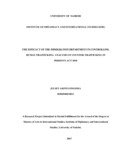The Efficacy of the Immigration Department in Controlling Human Trafficking: Analysis of Counter-trafficking in Person’s Act 2010
| dc.contributor.author | Ongoma, Juliet A | |
| dc.date.accessioned | 2018-01-05T09:58:25Z | |
| dc.date.available | 2018-01-05T09:58:25Z | |
| dc.date.issued | 2017 | |
| dc.identifier.uri | http://hdl.handle.net/11295/102219 | |
| dc.description.abstract | This study explored the efficacy of the immigration department in controlling human trafficking: analysis of counter-trafficking in person’s Act 2010. The main objective of this Research is to establish to examine the implementation of the counter-Trafficking in Persons Act 2010. The specific objectives were to discover the importance of human trafficking happenings in Kenya; to survey the human traffic practices and implementation plans in Kenya; to investigate the trafficking policy implementation process and analyse the gaps observed. The study employed a qualitative approach and sought to cover the exploratory and descriptive elements of the research process. The first part of the study gives a background of human trafficking policy implementation. The second part provides details of international perspectives of human trafficking. In the third part, the complexity in human trafficking is explored. Lastly, the fourth part of the paper presents a critical analysis of the implementation of trafficking in persons Act. | en_US |
| dc.language.iso | en | en_US |
| dc.publisher | University of Nairobi | en_US |
| dc.rights | Attribution-NonCommercial-NoDerivs 3.0 United States | * |
| dc.rights.uri | http://creativecommons.org/licenses/by-nc-nd/3.0/us/ | * |
| dc.title | The Efficacy of the Immigration Department in Controlling Human Trafficking: Analysis of Counter-trafficking in Person’s Act 2010 | en_US |
| dc.type | Thesis | en_US |



